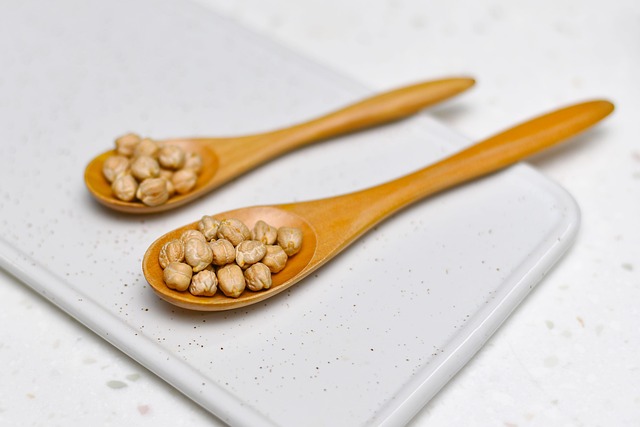1) Ensure complete protein: tyrosine + phenylalanine from the diet
Tyrosine is obtained directly from protein foods and also by conversion from phenylalanine . Prioritize at each meal: legumes (lentils, chickpeas, beans, soy/tempeh/tofu), eggs and dairy products , fish and lean meats , nuts and seeds (almonds, peanuts, pumpkin, sesame). Recent review: Nutrition (macros and micronutrients) modulates the diet-microbiota-thyroid axis and, therefore, thyroid function. ( MDPI )
To identify specific foods and their amino acid content (including tyrosine), you can consult the official USDA FoodData Central database . ( fdc.nal.usda.gov )
2) Sufficient iodine (without excess)
Iodine is essential for iodinating tyrosine residues in thyroglobulin. Good sources include fish/shellfish , eggs , dairy products , and iodized salt . Scoping review (Nordic countries) and NIH fact sheet updated in 2024 summarize requirements and upper limits (UL) for adults. ( PMC )
3) Dietary selenium: fish/seafood, whole grains, and (with caution) Brazil nuts
Selenium is involved in deiodinases and antioxidant defense. A 2024 meta-analysis (Thyroid) found reduced TSH and TPOAb in Hashimoto’s (RCA/GRADE synthesis); this is a useful framework for understanding its role, although we focus on dietary sources here . ( PubMed )
If you choose Brazil nuts as a natural source, keep in mind that their selenium content varies greatly depending on the soil: analytical studies report ranges of orders of magnitude; studies from 2024–2025 confirm this variability and propose alternatives such as Brazil nut butter for its greater homogeneity. ( PubMed )
4) Iron and zinc: cofactors that determine thyroid function
Iron deficiency is associated with thyroid dysfunction (synthesis and transport); a 2023 meta-analysis summarizes this. ( PMC )
For zinc , recent population data show an association between zinc deficiency and a higher frequency of thyroid disorders/autoimmunity. Rich foods: seafood , meats , seeds , and legumes . ( PMC )
5) Vitamin A and other vitamins
Vitamin A interacts with thyroid metabolism and iodine; recent reviews and studies explore these relationships (without suggesting indiscriminate supplementation). Sources: liver (occasional use) , dairy/eggs , and orange/leafy vegetables . ( MDPI )
6) Cruciferous vegetables: update the myth
A 2024 review concludes that brassicas (broccoli, cauliflower, kale, Brussels sprouts) do not adversely affect the thyroid if iodine status is adequate , especially when consumed cooked . They do not need to be excluded from a varied diet. ( PMC )
Practical menu ideas (100% food-based)
- Breakfast : Plain yogurt + pumpkin and sesame seeds + fruit; or omelet with spinach. (Protein + zinc + magnesium). ( fdc.nal.usda.gov )
- Lunch : Lentils with brown rice and steamed broccoli salad with lemon. (Complementary amino acids + cooked cruciferous vegetables). ( PMC )
- Dinner : Salmon or sardines with sweet potato and vegetables; or sauteed tofu with sesame seeds and vegetables. (Iodine/selenium/tyrosine from high-quality protein). ( MDPI )
- Snacks : almonds or peanuts ; edamame ; hard-boiled egg . (Stable supply of tyrosine/phenylalanine). ( fdc.nal.usda.gov )
Key readings (open access or with summary)
- Nutrition and Thyroid (2024, Nutrients) — diet–microbiota–thyroid axis and micronutrients. ( MDPI )
- Cruciferous vegetables and thyroid (2024, Nutrients) — safe with sufficient iodine. ( PMC )
- Iodine (2023, Nordic Scoping Review) + NIH 2024 factsheet — needs and UL. ( PMC )
- Selenium in Hashimoto’s (2024, Thyroid; meta-analysis of RCTs) — reference clinical evidence. ( PubMed )
- Iron and thyroid (2023, meta-analysis) — relationship between iron deficiency and thyroid dysfunction. ( PMC )
- Zinc and thyroid function (2024, population-based study) — association with thyroid disorders. ( PMC )
- Selenium variability in Brazil nuts (2017–2025) —a basis for prudent consumption. ( PubMed )
Note : The standard treatment for hypothyroidism is levothyroxine (LT4). Tyrosine is not a substitute for medication. The following is general nutritional support; if you use LT4, follow the guidelines for separating meals and supplements.
Date: 09/15/25
PHOTO: PIXABAY
Note: The Nutrigenomics Institute is not responsible for the opinions expressed in this article.






